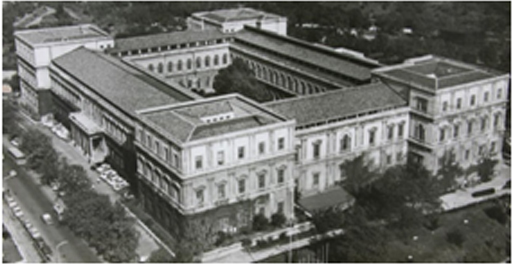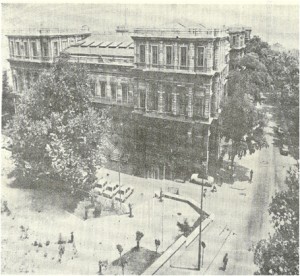
The Faculty of Chemical and Metallurgical Engineering have four academic units including the departments of Chemical Engineering, Metallurgical and Materials Engineering and Food Engineering and Bioengineering Program. The Chemical Engineering Program is one of the relatively younger programs of the Istanbul Technical University of 237 years of age, which is the oldest engineering school in the country. The Chemical Engineering education at the Istanbul Technical University was initiated in the Maçka Technical School in 1958 as a four-year program issuing undergraduate degrees, and the first class of chemical engineers was graduated in 1962. The Faculty of Chemistry was founded in 1963 and a five-year program issuing graduate degrees (equivalent to an M.S. degree) in Chemical Engineering was pursued in between 1963 - 1969. A transition to separate undergraduate and graduate programs of four and two years, respectively, was realized in 1969. The Faculty of Chemistry was organized as six divisions (analytical chemistry, inorganic chemistry, organic chemistry, physical chemistry, industrial chemistry and chemical engineering fundamentals) in those years. In 1982, the latter two divisions (industrial chemistry and chemical engineering fundamentals) offering about 60% of the undergraduate courses at the time, were restructured to form the Program of Chemical Engineering in the Faculty of Chemical and Metallurgical Engineering, while the other four divisions were reorganized as the Chemistry Program in the Faculty of Science and Letters.
The education of metallurgical engineering in Turkey started in 1961 with the foundation of the Metallurgical Engineering Program in ITU within the Faculty of Mining. In 1977, the program became an independent faculty; but following the restructuring and reconstruction of the Turkish Higher Education Council, it became a part of the newly established Faculty of Chemical and Metallurgical Engineering in 1982. In 1998, the name of program has changed to the Metallurgical and Materials Engineering, taking into consideration the country’s changing needs, world trends, scientific approaches and technologies. The Metallurgical and Materials Engineering Program’s 49 year-old “cooperation and consensus” have always been her guiding principles throughout these years. The program’s continuous effort to improve itself has been reflected in its students who have become among the most sought after graduation in domestic industry. The graduates have been very successful abroad, in industry, as well as in research and academic institutions. The majority of the faculty members have also been serving in other universities’ metallurgical and materials engineering programs of Turkey (over 10 programs) most of whom are holding Ph.D. degrees received abroad. Most of the program’s graduates work in leading institutions in Turkey.

The Food Engineering program of the Istanbul Technical University is the first being offered in Istanbul. The Program admitted the first students in the 1990-1991 academic year. ITU Food Engineering presently offers both undergraduate and graduate programs. The graduates are successfully recruited by a variety of food companies and some have been accepted to graduate programs. The full-time faculty of the Food Engineering Program has a broad range of technical interest and expertise, and their diverse backgrounds are quite consistent with the multi-disciplinary nature of the food engineering discipline. The program has been evaluated to be substantially equivalent to the programs offering a similar degree in the US by ABET in 2003 and accredited in 2010.
Bioengineering, started in 2006 is a dual-diploma; interdisciplinary and paid program being carried out by the Istanbul Technical University (ITU) and the Montana State University (MSU). The main aim of the program is to educate students as bioengineers acknowledged in the international level. Students complete their degrees by working equal time at both universities. The freshman and junior courses are taught by ITU, sophomore and senior courses are taught by MSU. For graduation, the students must meet the program requirements of both partner universities. The language of courses offered in the program is English. Thus the students are required to meet sufficient level of TOEFL score which is 525 PBT or 71 iBT. If necessary, one-year pre-freshman intensive English language preparation is provided by ITU. Upon completion the program successfully, each student is awarded with two diplomas; one from ITU and one from MSU.
Degrees offered at graduate level by the Institute of Science and Technology in the fields of Chemical, Metallurgical and Materials and Food Engineering are listed below:
- Chemical Engineering M.Sc./Ph.D.
- Food Engineering M.Sc./Ph.D.
- Materials Engineering M.Sc.
- Ceramics Engineering M.Sc.
- Extractive Metallurgy & Technologies M.Sc.
- Metallurgical and Materials Engineering Ph.D.